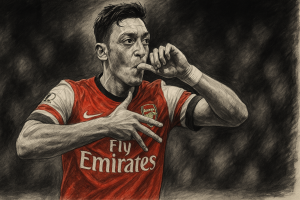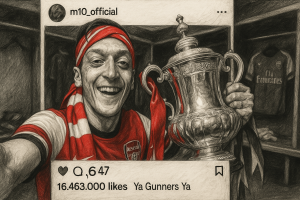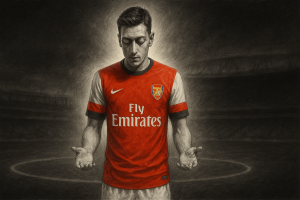He came not just with a price tag, but with a promise.
From the royal whites of Madrid to the red reverence of Highbury’s heirs,
Mesut Özil arrived — like silk on gravel. Like moonlight in a thunderstorm.
Arsène Wenger, paddle raised. Real Madrid, the auction house. And out of nowhere, Arsenal — yes, Arsenal — placing the winning bid.
It was surreal.
We don’t do this. We don’t steal the show on deadline day.
For years, we were the club that made stars, not bought them.
Adept at sculpting promise out of potential,
turning anonymous boys into household names.
But here we were,
breaking the bank for a ballerina of the ball.
A footballing composer whose instruments were space, silence, and split seconds.
£42.5 million. A record. A revelation.
Hope, suddenly, had a German accent.
The Good – The Touch of a Genius
He saw passes that didn’t exist —
not until he imagined them.
He didn’t just play football… he painted it.
A quiet conductor in a game obsessed with noise.
Mesut Özil played like he’d been given a secret version of time.
While others rushed, he waited.
While defenders lunged, he glided.
Eyes scanning in slow motion, feet whispering lullabies to the ball.
There was elegance in every movement,
but don’t confuse that for laziness.
He didn’t chase because he didn’t have to.
Why run when you’re already three moves ahead?
With Alexis, he danced.
With Giroud, he orchestrated.
With Ramsey, he read each run like it was written in his native tongue.
Their fluency became ours — a team that could purr when Mesut purred first.
2015/16: The season he bent the league to his will.
Nineteen assists. And it could’ve been thirty.
He created more chances than any player had before —
a record, yes… but this wasn’t about numbers.
This was about moments.
Moments like Leicester, 2018 —
a touch that defied physics, a finish that oozed silk.
Moments like Ludogorets —
yes, a pub team… but that goal was divine comedy.
A feint, a flick, a flourish.
A finish from another realm.
Napoli — volleyed violence disguised as grace.
Liverpool — gliding past bodies as if gravity had simply let go of him.
He played football as if it were a privilege.
And for those watching, it was.
And then, there were the signatures —
the little things that made Mesut Özil feel like a character written by the footballing gods.
The celebration — thumb in mouth, fingers forming the letter M.
A tribute not to sponsors, nor slogans, but to family. To love.
Beautifully personal. Quietly iconic.
A moment of intimacy on the grandest stage.

And the way he struck a football —
not lashed, not belted, not thundered —
but kissed, with the kind of affection others reserve for fine wine or symphonies.
Even José Mourinho, never one to dish out casual praise,
once said: “When Özil hits a ball, it makes a different sound.”
He wasn’t wrong.
And then there was the finish.
The finish.
A bouncing ball, a split-second decision,
and suddenly the world is watching a move that should not exist.
The Özil chop shot —
not power, not panic — but poise, pressed into the turf.
A flick that elevates the ball over the keeper
like a ballerina tiptoeing over barbed wire.
It’s not just confident. It’s arrogant.
Not cruel, but cheeky. Like he’s playing a game within the game.
This is the man who once played keepy-uppy… with a piece of chewing gum.
Then volleyed it skywards — and caught it back in his mouth.
Who does that?
Filthy, frankly.
Filthy, in the most glorious sense of the word.
And he did it all with that slightly reserved smile —
the look of a man who knew he was a cheat code,
but would never brag about it.
Just a grin. As if to say: you saw that, didn’t you?
The Great – The Artist, the Enigma
He was the puppet master in a world of puppets with broken strings.
At times, he seemed to be playing another game entirely.
Always in space. Always in rhythm.
Always one frame ahead of the rest of the film.
He came for Thierry’s assist record —
and had finishing been kinder, he would have taken it.
Nineteen assists. Nineteen gifts.
Many squandered, many applauded, all unmistakably Özil.
But greatness isn’t measured solely in league tables.
It is also forged in cup finals, in Wembley arches,
in afternoons where silver is at stake.

Three FA Cups.
Three medals worn by others, but imprinted with his fingerprints.
He was always the headline.
The masterpiece tapestry,
he stitched it all together.
Chelsea, 2017 — he danced through blue shirts like a dream refusing to end.
Manchester United — dissected, dismantled.
And even in Europe — Bayern, briefly, beautifully undone.
But beyond goals and glory, Özil altered the aura.
He brought swagger back to Arsenal.
Not the forced bravado of empty posturing —
but an effortless cool. The kind you can’t fake.
With every no-look pass, every shrug of genius,
he reminded us: this club is special.
We felt elite again — not because of what we had won,
but because of how we played.
In that golden spell, Mesut Özil was not just part of Arsenal.
He was Arsenal.
The Ugly & The Exit – The Fade of the Phantom
And then… the silence.
From crescendo to quiet. From centrepiece to sideshow.
Mesut Özil, once the heart of Arsenal’s symphony,
found himself playing to an audience that no longer listened.
January 2018 — a signature soaked in gold.
£350,000 a week. A contract not just of money,
but of expectation, of weight, of scrutiny.
We cheered it. We needed it.
A declaration of ambition. A refusal to lose yet another jewel.
But greatness comes at a price — and Mesut paid it in isolation.
What followed was not decline…
but disappearance.
Under Emery, he was questioned.
“Intensity,” “tactical reasons” — buzzwords masking uncertainty.
A player too elegant for a world demanding blunt force.
Then came Mikel — once a teammate, now a tactician.
For a heartbeat, Özil returned. A flicker of the old fire.
But just as quickly, he vanished again.
Not injured. Not suspended. Just… omitted.
Frozen out like a secret we didn’t want to explain.
And off the pitch, the world intruded.
He spoke very publicly about the persecution against Muslims in China.
A stand that demanded courage — and came at a cost.
Arsenal, silent. Özil, not.
Was it politics? Was it performance?
Or was he simply no longer part of the plan?

The fanbase fractured.
Some stood by him — loyal to the artist, the principle, the poetry.
Others grew tired — of ghostly performances, of social media over sweat.
A war of perception.
Was he fading… or being erased?
And then, one January afternoon in 2021,
he was gone. Quietly. No press conference. No Emirates farewell.
A move to Fenerbahce.
A goodbye written in lowercase.
No testimonial. No curtain call.
Just echoes. Whispers of what had been.
And we were left with the ache of unresolved emotion —
a player who had given us magic,
but left us with questions.
Not hated. Not truly celebrated.
Just… missed.
A complicated goodbye to a complicated genius.
The kind that only football — only Arsenal — can produce.
Legacy – A Beautiful Complication
There are players who fill the stat sheets.
There are players who fill the trophy cabinet.
And then, there are players who fill the soul.
Mesut Özil belonged to the last of these —
a footballer who felt different. Who made us feel different.
He was a beautiful complication.
A paradox wrapped in grace —
fragile, yet fearless.
Fleeting, yet unforgettable.
To some, he underachieved.
A man who offered glimpses of greatness, but never gripped it tightly enough.
But to others —
he was the most gifted player to wear the cannon since Bergkamp.
The weight of that comparison is heavy. But the elegance? Undeniable.
He did not thunder through games.
He floated through them.
Where others imposed, he invited.
A creator, not a conqueror.
And in his wake came the new guard —
Ødegaard: Scandinavian poise, Scandinavian precision.
Not a replacement. Not a replica.
But a continuation —
the same stage, a new script.
The story of modern Arsenal passes through Özil’s boots.
Because he marked a moment —
when the club said: we are back in the market for magic.
And for a while… we had it.
He wasn’t the saviour.
He wasn’t flawless.
He was never meant to carry the world — only to colour it.
But he was ours.
And for a fleeting, brilliant time,
he made us dream in technicolour.
Thank you, Mesut.
For the vision.
For the velvet.
For the nights when football looked like poetry —
and Arsenal looked like art.
Victoria Concordia Crescit
